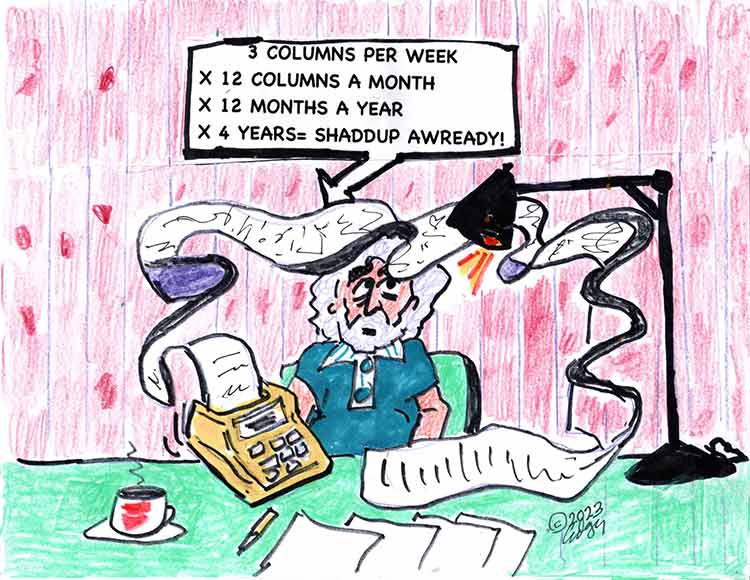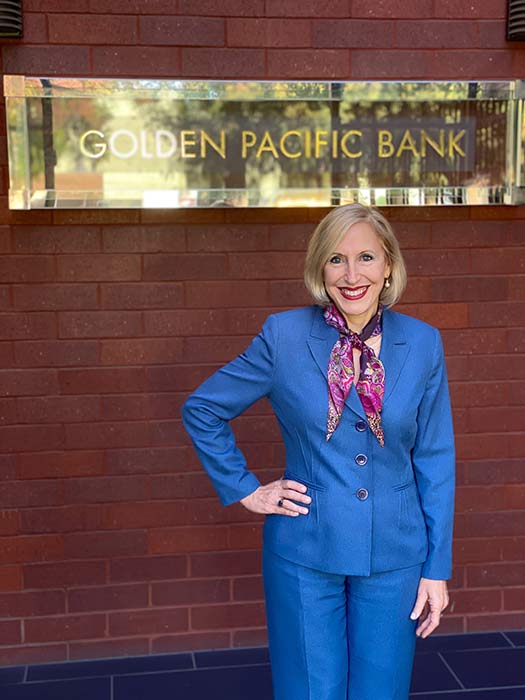Caution: We Bump into Two Milestones Today
An anniversary and, at no extra charge, a birthday
By Ed Goldman
Today is not only the fourth anniversary of The Goldman State but also the 73rd birthday of The Goldman.
I volunteer both factoids because, as we learned from USA Today, many of us dig numbers (remember its illiteracy-inducing tagline, “The newspaper for people who don’t have all day to read one”?).
Numbing numbers
So here’s a quick rundown of some not-very-vital statistics about this column:
– We’ve published three Goldman State columns each week, 52 weeks of the year, for four years. This means there’ve been 624 of them since November 15, 2019.
– I lied. The column didn’t come out on one of its assigned days, owing to a technical error or possible hangover. So make that 623 columns.
– While that may sound like a lot, if you add up the number of days you showed up for work in the same period—five times a week multiplied by 50 weeks a year (assuming you took off two weeks for vacation and a sick day to attend a sports event or have your lips injected with enough Botox to make you resemble a blowfish), your total comes to 250 work days, multiplied by four years: 1,000.
This means you’ve worked about 37 percent harder than I have. I’d share my calculations with you but I’m running out of fingers, toes, matchsticks and crayons.
– In fact, you and I would have near-identical work numbers if we compared the eight years I spent writing a five-times-a-week column for the Sacramento Business Journal and you went to your job during those same eight years. We’d each have logged about 2,080 work days for the same period. But there’d be a margin of error: you took vacations and I didn’t.
– On the other hand, it didn’t take me eight hours a day to write each column—not even when the person I was interviewing had a severe stammer or took a short break to have an appendectomy. And even if he or she had or did, only about a third of my columns included interviews.
I wasn’t aware of that last statistic until a former Business Journal editor—the late Jack Robinson, whom I adored—told it to me. He also said about 65 percent of those interviews were with women. I had thought he was about to suggest something unseemly about that but in fact, he was pleased. He supported feminism—to the point of giving up his job to follow his young wife Jennifer back east so she could pursue her work, as a master’s degree student and then as a historic preservationist. You don’t meet many men like this in the business world. Or any worlds, for that matter.
It wasn’t the first time that statistic—about the plurality of my interviews being with women—was leveled at me as though it were less an exercise in addition than an accusation.
I can tell you that if the percentage is accurate, I didn’t set out to achieve it. But I will also tell you that it’s probably true because I often prefer interviewing women.
The reason has nothing to do with attraction, longing or political correctness. It’s because men tend to be more predictable than women in interviews. If the men are successful in business, they don’t say many surprising things, frequently speaking in terms of sports (“I always kept my eyes on the prize”) or military strategy (“I never took a scorched-earth approach to my own success”). Those were actual quotes, by the way. I occasionally think of warning interviewees, “You do know I’m writing down your festival of clichés, right?”
Women, by contrast, tend to be storytellers, and have no problem crediting the people (men and women) who helped them along on their journeys. Guys don’t do that as much. Many men like you to believe they tumbled out of their mothers fully formed, with already dangerous pasts, romantic exes and old football injuries.
In the past 20 years, men have become much vainer about revealing their ages than women are presumed to be—and sometime were, decades ago. But in those same 20 years, most women I interview have become downright militant about telling me how old they are—while many men ask, “Is revealing my age necessary for your article?”
It’s really not and really has never been. But I find that readers enjoy getting a sense of where people I talk to may fall on the actuarial charts. Sometimes it inspires them (“Look at how old they are and they’re still full of pep!”) and sometimes reassures them (“Well, of course he’s more successful than I am. He’s got 32 years on me!”).
As a general rule, I never ask people how much they earn, which frustrates some of my editors at business publications. This is because the only non-bendable component of my personal code is to never ask how much money someone else makes nor reveal how much (or little) I make. My parents were adamant about this and so am I.
In the past four years, very little has changed about this column, I’m reluctant to report. Its initial premise, and name, was to talk about all things California. But as subscribers inexplicably began to pop up in 39 other states, Canada and even Europe, it was clear that they weren’t signing on solely for updates on Gavin Newsom, who’s grooming himself to become The Man Who Would Be Biden (should Biden step away from the race. If you know anything about politicians, you’ll perhaps agree that this is as likely to happen as Donald Trump taking the stairs instead of a convenient escalator, elevator or sedan chair).
We also added a podcast a few months ago so we could join the country’s four million other podcasters (that’s a real number). I did so because I evidently suffer from severe FOMO—which, if you’ve just joined the vernacular present, means Fear Of Missing Out. The numbers are, to date, gratifying, if you have a very low gratification threshold.
So thank you for joining me whenever you can and for re-posting the columns you like. I’ve received emails from a number of people who aren’t on the subscriber list and some have even ended up signed up. Maybe they’re hoping I’ll turn out to be USA Today.
Ed Goldman's column appears almost every Monday, Wednesday and Friday. A former daily columnist for the Sacramento Business Journal, as well as monthly columnist for Sacramento Magazine and Comstock’s Business Magazine, he’s the author of five books, two plays and one musical (so far).
Yes, Virginia
A Weekly Blog by Virginia Varela
President, Golden Pacific Bank, a Division of SoFi Bank, N.A.
photo by Phoebe Verkouw
DON’T START OUT YOUR DAY WITH SCAM AND EGGS
Every day, thousands of people fall victim to fraudulent calls, emails and texts from scammers pretending to be from their bank.
The goal of any bank scam is to get access to your bank account. Unfortunately (for scammers), they usually can’t get access to your account without your help.
Bank scams commonly require that you share personal financial information with a scammer, install malware on your devices, or use unverified checks and other banking material.
Here are some of the common ways a bank scammer will target you:
– Send you fake checks that legally bind you to some action.
– Send a spam email or fake text message that requires you to respond with a log-in code or with a link to download malware.
– Get you to share your credit card number or bank account information on a phishing website.
– Pretend to be a bank representative and ask for your account number over the phone.
– Try to gain remote access to your online banking platform through malware or viruses.
– Buy your banking information on the Dark Web.
The good news is that in many cases, you’re in control of what bank scammers can steal. The more you understand how they try to pull off bank scams, the more secure your account information and money will be. I’ll have more next week—and that’s not a scam!
Golden Pacific Bank is now Golden Pacific Bank, a Division of SoFi Bank, N.A. Member FDIC 2023 Golden Pacific Bank. This information should be used for informational purposes only.
sponsored content














